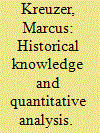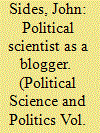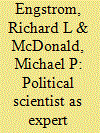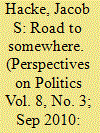|
|
|
Sort Order |
|
|
|
Items / Page
|
|
|
|
|
|
|
| Srl | Item |
| 1 |
ID:
097023


|
|
|
|
|
| Publication |
2010.
|
| Summary/Abstract |
Political scientists commonly draw on history but often do not read actual historians carefully. This limited engagement with historians, and with contextual information more generally, contributes to a loss of historical knowledge that can undermine the validity of quantitative analysis. This article makes this argument by means of an examination of the qualitative evidence underlying the important quantitative arguments about the origins of electoral systems advanced by Carles Boix and by Thomas Cusack, Torben Iversen, and David Soskice. The article explores how their respective attention to historical knowledge affects the quality of their data, the plausibility of their hypotheses, and, ultimately, the robustness of their statistical findings. It also analyzes how such knowledge sheds new light on the causal direction between institutions and their economic effects.
|
|
|
|
|
|
|
|
|
|
|
|
|
|
|
|
| 2 |
ID:
116385


|
|
|
|
|
| Publication |
2012.
|
| Summary/Abstract |
Political scientist Roy Godson defined counterintelligence as the identification and neutralization of the threat posed by foreign intelligence services, and the manipulation of those services for the manipulators' benefit. 1 Organizational counterintelligence disciplines, while having focal entities, typically function as overlays across the whole of the intelligence enterprise. Between 2009 and 2011, the Hizballah organization engaged in a major counterintelligence sweep across Lebanon. Combined with other counterintelligence activity, since the 2006 Summer War (also called the Harb Tammuz) nearly 200 Lebanese citizens-Christians, Sunni and Shi'a Muslims, senior military and retired civilian executives-were arrested and credibly accused of espionage. Some of these Lebanese had spied on behalf of Israel for decades and others were more recently compromised. Following is a discussion of the increasing scope and complexity of Hizballah's counterintelligence apparatus in light of these developments.
|
|
|
|
|
|
|
|
|
|
|
|
|
|
|
|
| 3 |
ID:
096214


|
|
|
|
|
| Publication |
2010.
|
| Summary/Abstract |
As a political scientist with expertise in human rights and the Balkans, I was invited to provide critical commentary and analysis of Kosovo's declaration of independence in February 2008 for CNN International. I offered an analysis rooted in the understanding and interpretation of international law, foreign policy, and domestic politics of Serbia and Kosovo. While I was not surprised that my analysis was not popular in Serbia-after all, I did argue that the independence of Kosovo was legitimate-I was surprised at the level of ethnic intensity and the broad-based hostile reaction to my CNN appearance in Serbia. This article first documents the harassment campaign I experienced. I then conduct textual analysis of the hate mail and online postings to offer insights about ethnicity's relation to identity, gender, and political analysis in the public sphere. I conclude by discussing how identities of researchers-as crafted by themselves and others-help define analytical tools we use in scholarly inquiry.
|
|
|
|
|
|
|
|
|
|
|
|
|
|
|
|
| 4 |
ID:
105377


|
|
|
|
|
| Publication |
2011.
|
| Summary/Abstract |
Surveys, experiments, large-N datasets and formal models are common instruments in the political scientist's toolkit. In-depth interviews and focus groups play a critical role in helping scholars answer important political questions. In contrast, participant observation techniques are an underused methodological approach. In this article, we argue that participant observation techniques have played and should continue to play a key role in advancing our understanding of political science. After demonstrating the use of these techniques, we offer readers advice for embarking upon participant observation research and explain how this approach should fit into a scholar's long-term career plans.
|
|
|
|
|
|
|
|
|
|
|
|
|
|
|
|
| 5 |
ID:
105378


|
|
|
|
|
| Publication |
2011.
|
| Summary/Abstract |
In November 2007, I helped found a blog, The Monkey Cage, with two of my colleagues, David Park and Lee Sigelman. This site joined a nascent political science blogosphere that is now composed of at least 80 blogs (Farrell and Sides 2010). The goals of The Monkey Cage are to publicize political science research and use this research to comment on current events. Although blogging is a promising way for scholars to promote their work to a larger audience, political scientists have been slow to take up this medium. To be sure, blogging is not without its challenges, particularly in terms of the time and energy needed to maintain a site. But blogging can also have its benefits by not only helping political science reach a broader audience, but also aiding individual scholars' research, teaching, and service goals.
|
|
|
|
|
|
|
|
|
|
|
|
|
|
|
|
| 6 |
ID:
105382


|
|
|
|
|
| Publication |
2011.
|
| Summary/Abstract |
Political scientists serve in courtrooms as expert witnesses on many topics related to their professional training: elections, same-sex marriages, employer sanctions for hiring undocumented aliens, school desegregation, political asylum requests, property rights, and racial profiling, among many others. It is not by chance that we-the authors-have chosen to testify as experts in cases concerning elections (see also Cain 1999). Election-related cases compose a large percentage of all cases involving political scientists brought to court: a study of references to expert testimony by political scientists in published federal district court decisions from 1950 through 1989 reports that 61% involved election law issues (Leigh 1991). Our replication of this study for the period of 2000 through December 18, 2010, reveals that 74% of such cases (28 of 38) involved election law issues. These cases involved issues of minority vote dilution, redistricting, alternative election systems (cumulative and limited voting), campaign financing, voting equipment and invalid ballots, voter registration, nominating petition requirements, and a number of other issues.
|
|
|
|
|
|
|
|
|
|
|
|
|
|
|
|
| 7 |
ID:
105379


|
|
|
|
|
| Publication |
2011.
|
| Summary/Abstract |
During my 45 years as an academic, I have followed the admonition sometimes attributed to the legendary Jedi warrior Obi-Wan Kenobe that political scientists should "use [their] power for good and not for evil." In this spirit, I have devoted substantial portions of my career to public service by providing strategic advice and campaign management to candidates for small state and local elective offices-state legislature, county commission, city clerk or treasurer, school board, and the like-and supporters of citizen ballot initiatives. These campaigns generally cannot afford the professional campaign assistance that is now virtually a necessity for winning elections at all levels of government.
|
|
|
|
|
|
|
|
|
|
|
|
|
|
|
|
| 8 |
ID:
126336


|
|
|
|
|
| Publication |
2013.
|
| Summary/Abstract |
Those who write for this symposium faced two choices in their careers: producing highly specialized articles with little application to government controversies or devoting themselves to public policy and making contributions to it. They chose the latter. I want to explain my approach and also give recognition to the accomplishment of other scholars who have been engaged with contemporary issues. All of them are eminently comfortable in maintaining the original commitment of political science to public law. At the risk of overlooking deserving scholars, I also identify others who decided to orient their research to thinking about and helping to resolve government issues.
|
|
|
|
|
|
|
|
|
|
|
|
|
|
|
|
| 9 |
ID:
158613


|
|
|
| 10 |
ID:
165471


|
|
|
| 11 |
ID:
100781


|
|
|
|
|
| Publication |
2010.
|
| Summary/Abstract |
At least once a month, I receive an e-mail, phone call, or question from one of my colleagues-how do you get an op-ed into the New York Times? It seems that a great number of my colleagues have at least one public intellectual (PI) bone in their body that they are keen to display. They hold, often for good reason, that they have something to say that will serve the president, the American people, or even the world. Although I have no answer to the immediate question-it is easier to win a lottery than to get into the New York Times-I do have a few thoughts about the greater question: how can an academic, especially a political scientist, gain a public voice? Here, then, follow the lessons of fifty years of trying to speak in that voice, drawing on both my experiences and those of my colleagues.
|
|
|
|
|
|
|
|
|
|
|
|
|
|
|
|
| 12 |
ID:
099318


|
|
|
|
|
| Publication |
2010.
|
| Summary/Abstract |
Why did comprehensive health care reform pass in 2010? Why did it take the form it did-a form that, while undeniably ambitious, was also more limited than many advocates wanted, than health policy precedents set abroad, and than the scale of the problems it tackled? And why was this legislation, despite its limits, the subject of such vigorous and sometimes vicious attacks? These are the questions I tackle in this essay, drawing not just on recent scholarship on American politics but also on the somewhat-improbable experience that I had as an active participant in this fierce and polarized debate. My conclusions have implications not only for how political scientists should understand what happened in 2009-10, but also for how they should understand American politics. In particular, the central puzzles raised by the health reform debate suggest why students of American politics should give public policy-what government does to shape people's lives-a more central place within their investigations. Political scientists often characterize politics as a game among undifferentiated competitors, played out largely through campaigns and elections, with policy treated mostly as an afterthought-at best, as a means of testing theories of electoral influence and legislative politics. The health care debate makes transparent the weaknesses of this approach. On a range of key matters at the core of the discipline-the role and influence of interest groups; the nature of partisan policy competition; the sources of elite polarization; the relationship between voters, activists, and elected officials; and more-the substance of public policy makes a big difference. Focusing on what government actually does has normative benefits, serving as a useful corrective to the tendency of political science to veer into discussions of matters deemed trivial by most of the world outside the academy. But more important, it has major analytical payoffs-and not merely for our understanding of the great health care debate of 2009-10.
|
|
|
|
|
|
|
|
|
|
|
|
|
|
|
|
| 13 |
ID:
098199


|
|
|
| 14 |
ID:
096392


|
|
|
|
|
| Publication |
2010.
|
| Summary/Abstract |
Lyndon State College's (LSC) participation in the America's Future Initiative on the U.S. national debt, in association with Public Agenda, began with a grant application for funding to participate. After being awarded funding, as the sole political scientist, I was selected with approval by the administration to attend the September 11 to 13, 2008, opening conference in Washington, DC. Flying into Washington, DC, on September 11 surely was a sign of commitment. At the conference, participants were schooled on the initiative by George Mehaffy of the American Democracy Project, Andrew Yarrow of Public Agenda, the Concord Coalition's Diane Rogers, and Stuart Butler from the Heritage Foundation. As a political scientist, I was well-aware of much of what was presented, but to hear differing perspectives and review the data and presentation materials was an excellent experience.
|
|
|
|
|
|
|
|
|
|
|
|
|
|
|
|
| 15 |
ID:
100771


|
|
|
|
|
| Publication |
2010.
|
| Summary/Abstract |
Interest in deliberative theories of democracy has grown tremendously among political theorists, political scientists, activists, and even government officials. Many scholars, however, are skeptical that it is a practically viable theory, even on its own terms. They argue (inter alia) that most people dislike politics and that deliberative initiatives would amount to a paternalistic imposition. Using two large national samples investigating people's hypothetical willingness to deliberate and their actual participation in response to a real invitation to deliberate with their member of Congress, we find that (1) willingness to deliberate in the United States is much more widespread than expected, and (2) it is precisely those people less likely to participate in traditional partisan politics who are most interested in deliberative participation. They are attracted to such participation as a partial alternative to "politics as usual."
|
|
|
|
|
|
|
|
|
|
|
|
|
|
|
|
| 16 |
ID:
150523


|
|
|
|
|
| Summary/Abstract |
Why would a political scientist write a biography of a U.S. national security advisor? Biography focuses on a single individual and has no guidelines on where or how to collect evidence or on how to organize that evidence. Nonetheless, a biography of General Brent Scowcroft, national security advisor to Presidents Gerald Ford and George H.W. Bush, allowed me to provide a broad overview of forty years of U.S. foreign policy history, to conduct an in-depth study of the personnel and organization involved in the national security decision-making, and to narrate the life of an extremely influential and interesting public figure. Biography fulfills many of political science’s disciplinary objectives, in fact: it speaks to important issues of political science, it offers thick description and facilitates the drawing of causal inferences, it addresses agency and structure, it is falsifiable, and it is able to communicate with a larger public.
|
|
|
|
|
|
|
|
|
|
|
|
|
|
|
|
|
|
|
|
|